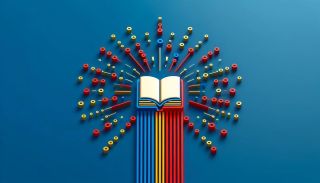Cognition
The Word Is Mightier Than the Algorithm
Is language itself the operating system for human-AI collaboration?
Posted June 2, 2024 Reviewed by Kaja Perina
Key points
- AI and LLMs are revolutionizing language, shifting the skills we value from math to effective communication.
- Language fosters human connection and community, with its magic lying in the unspoken spaces between words.
- Embracing verbal skills is crucial for harnessing AI's potential, while preserving our humanity in the future.

"In the beginning was the Word, and the Word was with God, and the Word was God." This opening verse from the Gospel of John alludes to the unique power of language and communication. As we enter the Cognitive Age, one often dominated by artificial intelligence (AI) and large language models (LLMs), these ancient words take on a newfound significance.
The Rise of AI and LLMs: Harnessing the Power of Language
The rapid advancements and adoption of AI, particularly with LLMs, are nothing short of astonishing. LLMs have demonstrated a remarkable ability to understand, generate, and manipulate human language with unprecedented fluency and coherence. These models can engage in complex conversations, answer questions, and even write creative fiction or poetry. In essence, they are harnessing the power of the word in ways that were once thought to be exclusively human.
The Shifting Landscape of Valued Skills
As AI continues to evolve, it raises important questions about the future of communication and the skills we value as a society. Traditionally, we have placed a high premium on mathematical ability, often seeing it as a marker of intelligence and a key to success in many fields. However, as AI becomes increasingly adept at solving complex mathematical problems, the landscape of valued skills may be shifting.
In a world where machines can crunch numbers and solve equations with ease, the ability to communicate effectively, think critically, and engage in creative problem-solving may become the distinguishing factors for human success. The power of the word, in all its forms—from persuasive arguments to poetic expression—could rise to the forefront.
When I Grow Up, I Wanna be...
This shift has significant implications for many aspects of life, from education to work. Schools may need to place a greater emphasis on developing strong verbal skills, fostering the ability to articulate ideas, collaborate with others, and adapt to new challenges. Fields that have traditionally relied heavily on math, such as finance and engineering, may begin to prioritize communication skills alongside technical expertise.
However, this is not to suggest that mathematical thinking will become irrelevant. Rather, the power of the word will lie in the ability to interpret and communicate the results of mathematical analyses, to explain complex concepts to diverse audiences, and to use language to bridge the gap between technical expertise and practical application.
The Social and Ethical Power of Words
Moreover, the rise of AI and the power of the word could have critical societal implications. As machines become more adept at handling computational tasks, we may see a rebalancing of the skills and abilities we value. This could lead to a more equitable and inclusive future, one that recognizes and rewards a diverse range of talents.
At the same time, the power of the word in the age of AI raises ethical considerations. As machines become more sophisticated in their ability to generate and manipulate language, we must grapple with questions of authenticity, trust, and accountability. How do we ensure that the words we encounter, whether generated by humans or machines, are truthful and reliable? How do we maintain the integrity of human communication in a world where AI can mimic our language with uncanny precision?
Language as a Tool for Connection and Community
However, the power of language extends far beyond its utilitarian function as a means of communication. From the ancient wisdom of the Upanishads, where the term "upanishad" itself means "sitting down near" in Sanskrit, to the rounds in a hospital, the dining room table, and even the campfire, the act of sitting close and leveraging language has been a powerful tool for fostering connection and community.
In these intimate settings, words become more than mere vessels of information; they transform into the threads that weave the tapestry of human relationships. Language, in this sense, serves as a functional glue, bonding individuals together through shared stories, experiences, and understanding. It is through the power of the spoken word that we create and maintain the social fabric that defines our communities and cultures.
The Magic Between the Words
As the legendary jazz musician Miles Davis once said, "I don't play what's there, I play what's not there." This curious insight extends beyond the realm of music and into the very heart of human communication. The true magic of language lies not just in the words themselves, but in the spaces between them—the unspoken emotions, the subtle nuances, and the profound connections that emerge when we read between the lines. It's in these "cognitive interstitial zones" that empathy, imagination, and creativity flourish, allowing us to transcend the literal and tap into the essence of what makes us human. As AI continues to master the mechanics of language, it is this ineffable "magic between the words" that may prove to be the enduring frontier of human expression and connection.
Shaping Our Future with the Power of the Word
The power of the word is not just about communication, but about connection. It is through language that we express our thoughts, share our experiences, and build relationships with one another. Perhaps we can even call language a functional operating system for humans and their technological partners.
As we navigate the challenges and opportunities of the Cognitive Age, embracing the power of the word and fostering strong verbal skills will be essential to harnessing the potential of AI while preserving the qualities that make us human. For in the end, it is not just the word, but the spirit behind it, that will shape our future.




